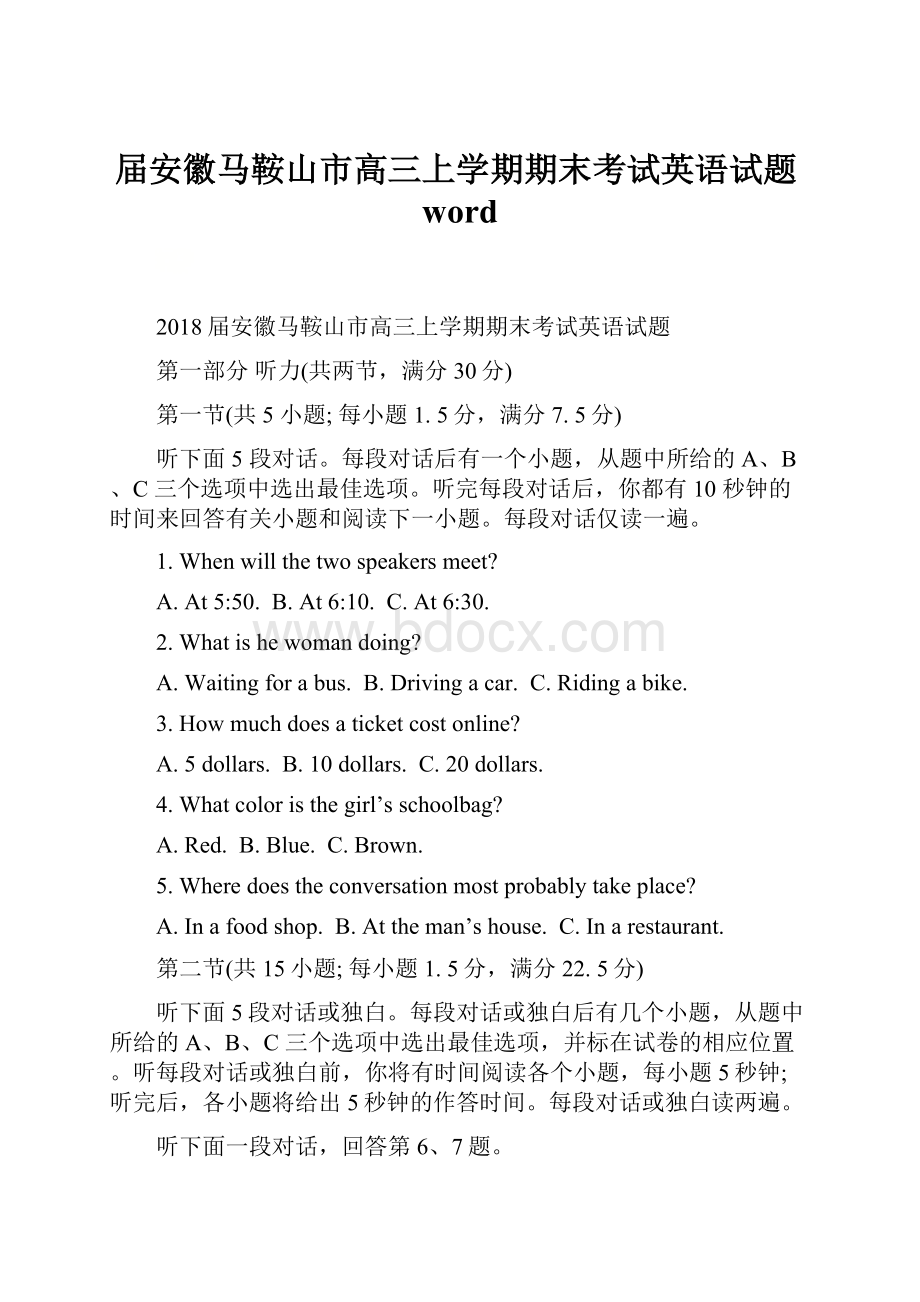届安徽马鞍山市高三上学期期末考试英语试题word.docx
《届安徽马鞍山市高三上学期期末考试英语试题word.docx》由会员分享,可在线阅读,更多相关《届安徽马鞍山市高三上学期期末考试英语试题word.docx(15页珍藏版)》请在冰豆网上搜索。

届安徽马鞍山市高三上学期期末考试英语试题word
2018届安徽马鞍山市高三上学期期末考试英语试题
第一部分听力(共两节,满分30分)
第一节(共5小题;每小题1.5分,满分7.5分)
听下面5段对话。
每段对话后有一个小题,从题中所给的A、B、C三个选项中选出最佳选项。
听完每段对话后,你都有10秒钟的时间来回答有关小题和阅读下一小题。
每段对话仅读一遍。
1.Whenwillthetwospeakersmeet?
A.At5:
50.B.At6:
10.C.At6:
30.
2.Whatishewomandoing?
A.Waitingforabus.B.Drivingacar.C.Ridingabike.
3.Howmuchdoesaticketcostonline?
A.5dollars.B.10dollars.C.20dollars.
4.Whatcoloristhegirl’sschoolbag?
A.Red.B.Blue.C.Brown.
5.Wheredoestheconversationmostprobablytakeplace?
A.Inafoodshop.B.Attheman’shouse.C.Inarestaurant.
第二节(共15小题;每小题1.5分,满分22.5分)
听下面5段对话或独白。
每段对话或独白后有几个小题,从题中所给的A、B、C三个选项中选出最佳选项,并标在试卷的相应位置。
听每段对话或独白前,你将有时间阅读各个小题,每小题5秒钟;听完后,各小题将给出5秒钟的作答时间。
每段对话或独白读两遍。
听下面一段对话,回答第6、7题。
6.Howdidthewomanfindherholiday?
A.Nice.B.Justso-so.C.Boring.
7.WheredidKatego?
A.ToSwiss.B.ToItaly.C.ToChina.
听第7段材料,回答第8、9题。
8.WhydidSusangotothegrocery?
A.Topickupthecake.B.Toinviteherfriends.C.Tobuysomedrinks.
9.Whatwillthechildrendointheafternoon?
A.Helpsetthetable.B.Haveaparty.C.Prepareforthedinner.
听第8段材料,回答第10至12题。
10.WhatisEmma’snewjob?
A.Aboss.B.Alawyer.C.Aspokeswoman.
11.WheredidEmmagettoknowaboutthejoboffer?
A.Fromanewspaper.B.Atapartyinherhome.C.IntheUnitedUnion.
12.WhodoestheUnitedUnionusuallyemploytogettheirmessageacross?
A.Famouspeople.B.Goodfootballers.C.Popularhosts.
听第9段材料,回答第13至16题。
13.What’stheprobablerelationshipbetweenthetwospeakers?
A.Teacherandstudent.B.Guideandvisitor.C.Hostandguest.
14.WheredoesEllenoftengoshopping?
A.IntheZenGarden.B.IntheHighlands.C.IntheRedRiverarea.
15.WhatwillEllendoforcompletequiet?
A.Gocamping.B.Studyinthelibrary.C.Readathome.
16.Whatarethespeakersmainlytalkingabout?
A.Acity.B.Nightlife.C.Healthyfood.
听第10段材料,回答第17至20题。
17.WhoisMichelleSmith?
A.Aworker.B.Anurse.C.Apatient,
18.WhatwillMichelledonextmonth?
A.GotoAfrica.B.Visitanursinghome.C.Teachthechildren.
19.Whichnumberwillyoudialtojointheproject?
A.244-395-8847.B.242-359-8847.C.242-395-8674.
20.WhatdoesMichellecallonpeopletodo?
A.Bekindtothechildren.B.Drinkcleanwater.C.Donatesomemoney.
第二部分阅读理解(共两节,满分40分)
第一节(共15小题:
每小题2分,满分30分)
阅读下列短文,从每题所给的A、B、C和D四个选项中,选出最佳选项。
A
SomescientistswintheNobelPrizefortheirwork.Otherscientistswinthe“IgNobel”Prize,whichhonorsrealsciencethatissostrange.“Wewanttomakepeoplelaughandthenthink,”saysIgNobelfounderMarcAbrahams.Heandhiscolleaguespick10oftheworld’sstrangestscientificstudiesonsubjectslikePhysicsBiology,Medicine,andsoon,tohonoreachyear.HerearetwoofthestrangestIgNobelwinnerssincetheprizewasfounded26yearsago:
No-blinkphotos,almostguaranteed.
Whyissomeonealwaysblinking(眨眼)inyourphoto?
Sciencesays:
becauseyoudon’ttakeenoughpictures.
Winner,2006MathematicsIgNobel:
AnAustralianphotographerwonderedhowmanygroupshotssheshouldtaketobeprettysurenoonewasblinking.Shefoundouyouneedtodividethenumberofpeopleby2tofigureitout.Twelvepeople?
Takeatleastsixphotos.Butwithgroupsover50,someonewillalwaysbecaughtblinkingnomatterhowmanyphotosyoutake.
Thefive-secondruleistrue—sometimes.
Haveyoueverdroppedfoodonthefloor,said,“Five-secondrule!
”thenpickeditupandeatenit?
Theideaisthatbacteriawon’tstickifyoupickitupquickly.
Winner,2005PublicHealthIgNobel:
JillianClarkwasstillinhighschoolwhenshedidherwinningresearchonthefive-secondrule.Shedroppedfoodsonthefloorandthenstudiedthebacteriatheypickedupinfiveseconds.Herdiscovery?
Ifthefloorisclean,thefoodissafetoeat.Buthowcleanisyourfloor?
Youneedapowerfulelectronmicroscopetoknowforsure.
21.Whywasthe“IgNobel”Prizefounded?
A.Topromotelaughterandthought.
B.Tohonorstrangescientists.
C.TohelppeoplewintheNobelPrize.
D.Tomakepeoplefightforhonors.
22.Howmanyshotsshouldyoutaketoensureano-blinkphotoforagroupof32people?
A.2.
B.6.
C.12.
D.16.
23.WhichsubjectwasJillianClark’sresearchabout?
A.Mathematics.
B.PublicHealth.
C.Biology.
D.Physics.
B
ThisisabigweekforMayaVanWagenen.HerveryfirstbookPopular,her8thgradediary,hitshelvesacrossthecountry.She’sinNewYorktoappearonTheTodayShow,anddoesamillioninterviewsthataccompanythebook’spublicationwhileshesayssheisworriedaboutkeepingupwiththelessonssheismissingbackatherhighschoolinGeorgia.
AsamiddleschoolerinaTexastown,Mayaonceconsideredherselfasanoutsider.“Ialwaysstruggledwithmakingfriendsandfindingconfidence,”shesays.“Ifeltbulled(欺负)andaloneanditwasreallyhardforme.”ShesaiditwasBettyCornell’sTeen-AgePopularityGuide,a1950show-tobookboughtbyherdadthatgreatlyinspiredher.Shedecidedtofollowtheadvice—devotingeachmonthofher8thgradeyeartodifferentchapterslike“Neat-looking”and“BeaHostess”—andseeifshecould,infact,becomepopular.Everyday,she’dtakennotesonhowpeoplerespondedtohersecreteffort(nobodyknewshewasconductingthissocialexperiment)andthenshe’dwritedetailedstoriesaboutherexperienceovertheweekend.
Aftershefinishedtheproject,shesentthediarytoherfamily.Herauntpassedittoawriterfriendwhointurnforwardedittohisagent.TheagentwantedtosignMayaimmediately.Itwasjustthebeginning:
Penguinwasthefirstpublishertobiteandshortlyafter,Dreamworksgotthemovieright.
Andwhileshe’sridingthehighofPopularforthetimebeing,shehassomethingelseonhermind:
hernextbook.Besidesallthathomeworkshehastodowhenshegetshome,sheisalsowritinganovel,forshehasatwo-bookdealfromPenguin.
“Peoplealwaysaskme,’Whydon’tyoujusthome-schoolsoyouhavetimetowork?
’”shesays.“Butit’sfuninschool,andIwanttobeayoungadultwriter!
Thisismychancetoexperiencehighschool,soit’sthemostimportant.”
24.BeforeshereadBettyCornell’sbook,Mayafeltthatherschoollifewas.
A.amazing
B.inspiring
C.difficult
D.simple
25.WhatisthebookTeen-4gePopularityGuidemainlyabout?
A.Adviceforteenagerstobewell-received.
B.Adviceforteenagerstotakenotes.
C.Waysforteenagerstoconductexperiments.
D.Waysforteenagerstowritestories.
26.WhichofthefollowingfirstpublishedMaya’sbookPopular?
A.TheTodayShow.
B.Penguin.
D.Heraunt.
C.Dreamworks.
27.WhatcanweinferfromMaya’swordsinthelastparagraph?
A.Herstudyathighschoolisnecessaryandimportant.
B.Morechancesareavailabletohome-schooledwriters.
C.Manyadultwriterswillcometovisitherschool.
D.Youngwritersshouldhaveteachingexperience.
C
ForaslongasIcanremember,seniorshaveattractedtoolittleattentionfromsocietyasawhole.Forexample,peoplemayshrinkphysicallyastheygetolderandhaveahigherincidenceoffalls,buthowmanypeoplehavethoughtaboutbuyingamorecomfortableandstablechairfortheirelderlyparents?
Wespendgenerouslyonourchildren,suchashiringanannytotakecareofthem.Whenwelookforanannyforourbaby,webelievethatsomeonewhocharges8,000yuanmustbebetterthanapersonwhocharges5,000yuanbecausetheyhaveabettergraspofhowtointeractwithbabies.Butwhenwelookforsomeonetotakecareofourelderlyparents,weusuallykeepourbudgetaslowaspossible.Wejustwanttoensurethatcaregiverswillpreparethreemealsadayforourseniors,butwedon’ttaketheirpsychologicalneedsintoconsideration.
Thedifferencesinattitudesareobvious.However,wearenotyetold,soperhapsit’shardforustounderstandthebitternessoftheelderly:
regression(衰退)inhealth,ahandfulofpillseveryday,notbeingabletocatchupwithdevelopmentsinthedigitalage,andthedisappearanceoftheoldstreetsandfavoriterestaurantsfromthegoodolddays.Thosearethekindsoflivestheyliveandwemayevenlivethroughsomethingsimilarinthedecadestocome.
Ifwethinkabouthowwewanttobetreatedwhenwegrowold,weshouldstartthechangestoday.Becausetheelderlywereoncethebackboneofsocietyandmadehugecontributiontheyshouldenjoythefruitsofthecounty’sdevelopmentaswell.
28.Whatsituationmightoldpeoplefaceaccordingtothetext?
A.Ahighandstableincome.
B.Physicalinconvenience.
C.Muchconcernfromthepublic.
D.Lackoffavoritefoodandfruits.
29.Whichofthefollowingcanreplacetheunderlinedword“nanny”inparagraph2?
A.tutor
B.coach
C.storyteller
D.babysitter
30.Whyisitdifficultforustounderstandthebitternessofoldpeople?
A.Becausewefailtocatchupwiththeirdevelopment.
B.Becausewearesharingasimilarlifestylewiththem.
C.Becausewearetooyoungtoexperiencetheircondition.
D.Becausewehavespentmuchmoneylookingafterthem.
31.Whatdoesthewriterthinkoftheelderly?
A.Theycanmakegreatercontribution.
B.Theydeservetheattentionfromsociety.
C.Theyshouldstarttochangethemselves.
D.Theyneedahandfulofpillseveryday.
D
Anoval-shaped(椭圆形)structure,whichisbelievedtobe121metersacross,isshowninapictureofAntarctica.
SomesaythestructureisevidencethathumancivilizationoncelivedintheSouthPole,whileotherssayitmaybeanaturalphenomenon.
“Whatif,inthedistantpast,anancientcivilizationdevelopedinAntarctica,creatingspl